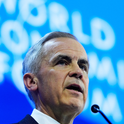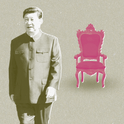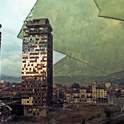Many prophets foretold the disaster. Rending their garments, they cried that these works of man deviated from all that was good and proper, and would bring destruction. The prophets were mocked. Some were even driven into the wilderness. But then it came—a freezing of markets, a collapse of structured products, a destruction of asset classes and a global credit crunch. Foretold by the prophets, yet somehow unpredicted by the risk models of banks and governments, it wiped trillions of dollars from the value of houses and dumped families out in the street in numbers far exceeding those of Exodus. The crisis threw communities, and commodities, into chaos—from New Zealand to Iceland, from soya to oil—and many bankers were fired and great was their woe.
***
Of course, the idea of economics as a religion is not new. As Max Weber pointed out early Protestants saw economic success as a sign from God that one was of the heavenly elect. It was a small step from there to seeking success to ensure one would be saved. Capitalism, as Walter Benjamin said, silently took over Reformation Christianity and replaced the religion with itself: it became a religion, the western religion. So when Protestantism arrived in America, in its purest form, so did capitalism: the Catholic Spanish Americas never thrived economically, in contrast to Protestant, Anglo-Saxon North America. My own experience bears this out—the collapse of Catholicism in Ireland in the 1990s mirrored the rise of capitalism: the Celtic tiger was Protestant.
But religions evolve, and recent events show that capitalism has begun to evolve less in the manner of the Galapagos finches (whose beaks adjusted over millennia to suit the berries of their individual island), and more in the manner of the Incredible Hulk. Incredible Hulk capitalism can expand the muscle of its credit so swiftly that its clothing of real world assets cannot stretch fast enough to contain it. Expansion, explosion, collapse—Incredible Hulk capitalism sprawls, stunned and shrunken again, in the rags of its assets.
Or, returning to our religious analogy, if capitalism was a religion, it would now be a delightfully demented pseudo-scientific cult. Incredible Hulk capitalism is to the capitalism of Adam Smith what Scientology is to the Christianity of Christ. Both modern high finance and Scientology use the language and tools of science to ends that are religious, not scientific. Both meet a need, a yearning which the old forms of religion and capitalism no longer meet. The need for a mysterious power greater than us, in which we can believe. It must be powerful—but it must also be mysterious. And mystery has been vanishing from the world ever faster, ever since Galileo.
We know what the stars are made of, and can compute their course through the heavens for the next 10,000 years. We can explain the storms and floods that were once evidence of the wrath of God. But as the advance of science has removed the divine mystery from much of life, the advance of free market capitalism has put it back. Only modern economics can now provide forces that we don't understand. And we need that in our lives.
***

Capitalism is seen as arrogant, but that is merely the rage of Caliban on seeing his reflection. The extraordinary thing about capitalism is its humility and refusal to judge. It will give us what we want; it will not force on us what it thinks we need. Often we are disgusted by what we discover that we want—but that reflects on us, not on the servant who brings us our fetish gear and saturated fats. It would bring us organic turnips just as happily. If we cease to desire a product, the producer changes, or ceases to exist. There is nothing more powerless than a corporation.
So how has something so powerless spread so fast? From Adam Smith to now is little more than 200 years. Islam, Christianity and the religions of the east took far longer to cover far smaller territories. And, even more interesting, why has modern capitalism suddenly, explosively, sped up its spread in the past 30 years?
For a system to bloodlessly replace an entrenched system, the newcomer must offer some significant improvement. And it must offer it to everyone. The religion of Abraham and Moses did not explode across the globe until Paul decided to make the version of Judaism preached by Jesus open to everyone, regardless of birth. Likewise, old-style capitalism was incapable of becoming a universal religion, because it did not offer the hope of salvation to all. Only those born into an elite of landowners and capital owners could access capital. But the recent rise of venture capital threw capitalism open to all, and made it at last a potentially universal religion.
***
Only one other change was necessary, and it came in 1971. For as long as money had to be backed by gold, economics was rooted in the material world (just as Christianity was merely an interesting philosophy for as long as Christ was alive). The abandonment of the gold standard was the crucifixion and resurrection of capitalism; the traumatic and liberating event which allowed capitalism to be purely religious and entirely driven by faith. As with all religions, once its link to the physical world was severed, free market capitalism mourned briefly, then experienced a surge of energy and expansion.
In an explosion of credit markets, deficit spending and faith-based money, it overwhelmed Soviet and Chinese communism and shook Islamic societies to their roots. It expanded further and faster than Islam after the death of Muhammad. The IMF and the World Bank sent their missionaries to every nation. And their language has now replaced Latin as the universal language, spoken by a sombre, dark-clad priestly caste, but mouthed without understanding by the ordinary people. People need that, they hunger for mysteries, a priesthood, shamans in touch with great forces. And modern high finance, like the Latin of the Christian Church, has profound mysteries at its core. Not even bankers know what a collateralised debt obligation cubed really is.
Where once the essential mystery was contained in the phrase fiat lux—let there be light—now it is contained in the phrase "fiat money." Money, that weightless thing, that spirit that is everywhere and nowhere: that nothing in everything, is the Holy Spirit of capitalism. And its touch can transform you in this life, giving it a big advantage over earlier religions, which offer you only consolation in the next. A bank with a capital base of $10bn can loan out $100bn. Yet with that money, people build real houses, drive real cars, eat real bread and drink real wine. Is this not an act of creation? Is this not a mystery worthy of God?
A banker can make a $1bn loan to a mining company. This faith-based money, backed by nothing, electronically transferred, is used to turn hills into holes. The mining company ships the resulting ore around the world. We live in the first age in which faith can literally move mountains. But as with all religious expansions, success bred hubristic dementia. The elevation of metaphysical above physical turned into a kind of contempt for the physical.
The world in which over $500 trillion in credit default swaps could be created by mostly US banks was also the world in which the US hadn't built a new oil refinery or nuclear reactor in 25 years, and whose bridges and levees were collapsing through lack of maintenance.
***
In any given era, the one true religion is so all-embracing, so saturates every area of life, that it almost vanishes. God accompanied the medieval Christian to the toilet, to bed, judged his thoughts, every action. Communism was so all-pervasive that husbands and wives censored private conversations (I live in east Berlin, and even today you can tell the older East Germans by the way they pause before replying to a question, as though they must still weigh up all the implications of speaking honestly).
Critics of consumer capitalism despair over the foolishness of the masses, who buy what they want packaged as what they need. But this is to misunderstand the transaction. We pray with our money, which is backed by nothing but faith, and a miracle happens—our baskets fill with goods, far more things than we could ever make or grow ourselves. In all other religions, you go to the temple and give the guardians food that, with difficulty, you have grown. Under this new, improved religion, the temple gives food to you. What happens, every time we shop in Tesco, is a miracle on a par with the loaves and the fishes.
Like all true religions, capitalism has entered into the cracks between people, filled the air, so that we can no longer find a place to view it. Except perhaps the desert… A few years ago I attended the Burning Man festival in Nevada. A city housing 30,000 people is built in the desert, for a single week. A Xanadu, dreamed into being every August. Burning Man's most interesting experiment is to run on a gift economy. Coffee and ice are the only products for sale. Every other need must be met out of your own resources or by gift from another. After the festival I helped take the city apart, leaving no trace that it had ever been. While doing so, I led a life that resembled that of a monk. I saw no money for those two weeks. When I was hungry, I was fed. If I needed clothes for the night, or tools to do a job, I asked, and I received.
Eventually, I returned from the desert, in a 22-wheeler truck. The truck stopped at a truck stop. I went in and took the food and water that I needed. As I walked out, a man standing behind a counter stared at me as I passed. And I stopped, and realised that I would have to find tokens made of paper and hand them to this stranger, and that all the complex human interaction involved in feeding a stranger, and all the difficulty and sweat of raising the food, had been replaced by an entirely symbolic exchange of green paper strips bearing an eye and a pyramid. And it seemed as wonderful and arbitrary as it must to an Amazonian tribesman encountering the city.
Back in my city, I switched on my miraculous electric light ("fiat lux!") and looked out across the miraculous city which no individual could have built. I saw miraculous light in the window of the rich and the same light in the window of the poor. Many talk about the inequalities of modern capitalism. But the truth is more subtle, and strange. Christianity once preached the equality of man, but could find no way to make the vision real. Communism tried, and failed, to force equality upon us. But only our modern, excitable, faith-based capitalism has delivered this degree of uniformity and equality. Ikea, with its €6 chairs, is delivering not only the Christian but the communist heaven: everyone equal, sitting on the same chair, illuminated by the same lamp, all over the world.
Read our roundtable discussion on the global financial crisishere











